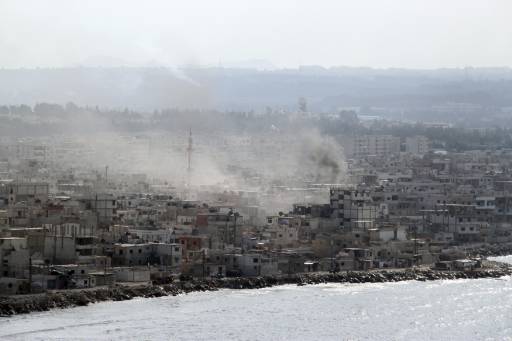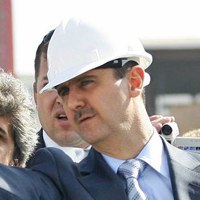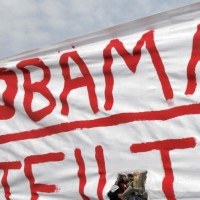![]()
Mon, Aug 15, 2011 | Rubin Reports | By Barry Rubin

Smoke rises from the Syrian city of Latakia on Sunday, Aug 14, 2011, after Syrian navy vessels bombarded it with gunfire. (Reuters)
Syria’s Revolution: A Bloodbath the West Cannot Ignore
There’s a real war going on with real massive human rights’ violations, real massacres, and real alternatives at stake. Yet the world slumbers about it. Oh sure, there are expressions of dismay at the lowest level of diplomatic language and cosmetic sanctions. Meanwhile, artillery and tanks are being used directly to kill as many civilian, nonviolent protestors as possible. Those captured are being tortured.
These events make Egypt’s revolution look like a picnic and Libya’s civil war look like a scrum. Yet where is the massive outpouring of Western demonstrators, the teach-ins, the outrage, the international resolutions, the humanitarian action on Syria?
It is a waste of time, mine and yours, to write about double standards. Double standards have become standard. Nor will I inform you by bewailing the front-page coverage, misplaced outrage, and outright slander devoted to the smallest incident in Israel-Palestinian frictions compared to these events. The same applies to the grilling of America for real and imagined sins.
And yet to keep things in proportion we must constantly remind ourselves and others that there are real, bloodthirsty dictatorships in the world, willing to stop at nothing, bound by no rules that are either self-imposed by morality or restricted by free institutions. In comparison to these — the terrorist-supporting, the hate-inciting, the consistently torturing, the always lying — is the reason why democracy is the best system and our cause is as just as anything that’s going to be seen in this sad and tragic world.
It is also probably a waste of time, mine and yours, to analyze why this happens. The traditional reasons are the desire of Western democracies to engage in troublesome confrontations, their attentions being directed inward, the lack of reporters on the scene, and so on.
One traditional factor, however, is lacking: having an interest in the survival of a repressive, ferocious dictatorship. The Syrian regime is an enemy of the West and would always remain so. It didn’t just support terrorism against Americans and other Western forces in Iraq; the Syrian regime was the number-one factor making that campaign of violence happen in the first place. It sponsors terrorism not only against Israel but also Jordan and Lebanon, turning the last-named country into a satellite. This is a regime that celebrated — though it had no role in — the September 11 attacks.
Yet it is also a regime that the Obama Administration has been courting and has coddled for 2.5 years and even now is reluctant, though it is grudgingly moving toward that point, to condemn even now. It is a regime that the Obama Administration has engaged and appeased as it has been so eager to condemn Israel at times. And it is a revolution the Obama Administration has been so reluctant to sympathize with though it embraced the overthrow of an ally in Egypt.
Another traditional factor not present is the lack of information. We know far more about Syria than about Libya where NATO rushed to engage in some sort of military campaign that we cannot even explain. The revolution is being covered by the media, but that’s where it ends.
Indeed, we have long known about this regime, as I wrote in my book, The Truth About Syria. In 1982, it massacred about 10,000 of its own citizens in Hama, leveling large parts of the city. And now Hama has risen again, and the regime is again trying to knock it down.
Of course, there are also all of the “new age” factors in this disproportionate response to deliberate massacres: the automatic Arab, Muslim, radical majority in the UN; the reluctance to criticize a Third World state; the choice of democracies and allies as scapegoats; the treatment of left-wing dictatorships as if they weren’t really dictatorships. But you also know all that already.
Is there legitimate concern about an eventual Islamist takeover? Absolutely yes. But the way to cope with that is through policy efforts. Note that in Egypt, U.S. policy did not make the tiniest effort to “tilt” events against the Islamists and yet jumped right in with actions that actually helped the Islamist side.
And this also: if this battle continues without Western assistance to the most democratic forces — I am NOT talking about sending troops — and escalates to full-scale armed struggle, it will be the Islamists who will take the lead over the opposition.
They will receive help from the Muslim Brotherhoods, just as the regime will be aided by Iran and Hizballah, and it will be the Spanish Civil War of our day. For our contemporary equivalents of Communism and Fascism in the Middle East are Sunni Islamism and Shia Islamism.
Moreover, the longer and more bitter the struggle the more likely will be a bitter communal struggle in which ordinary people are murdered merely because of their ethnic or religious identity.
And ask yourself this also, despite the Communist presence on the Loyalist side in the Spanish Civil War would you have thought in the late 1930s that it would be better if the Fascists won? Was it right for the United States to aid Iraq against Iran in their war? Yes. But in Syria there is the possibility of avoiding Islamist hegemony over the opposition, just as Western failure to aid the Loyalist side in Spain guaranteed the growing power of the Stalinists there.
Yes, true, we know the Obama Administration will stand aside, clueless, wringing its hands and — let’s be frank here — hoping that the regime will triumph. But the truth must be pointed out in hope that the foreign policy establishment will speak out against the increasingly obvious bankruptcy of White House policy.
The debt limit on Obama foreign policy has already been raised too high. Is it too much to ask this president to devote one-quarter the effort to Syria that he wastes on futile, even counterproductive, Israel-Palestinian peacemaking efforts?
Read this article in The New York Times — a newspaper that I so often criticize that I’m pleased to reference positively — about the all-out assault on the city of Latakia, traditionally considered a regime stronghold. It even includes naval bombardment of civilian neighborhoods.
The article says that Syria’s repressive actions have repeatedly “defied international condemnations,” a nice phrase for slaps on the wrist that are less heated than the average response to an Israeli announcement of building apartments in Jerusalem.
Read the Syrian Revolution Digest for the most comprehensive coverage. To get a sense of the magnitude of events, read just one day’s edition.
This is a tragedy and a shame that deserves our indignation even in the face of so many other abuses. Syria should be the top priority for Western governments in the Middle East at present. It isn’t. That’s dangerous.



 RSS
RSS










Syria’s Revolution: A Bloodbath the West Cannot Ignore | #Syria #Assad http://t.co/PLV3knd
Syria’s Revolution: A Bloodbath the West Cannot Ignore | #Syria #Assad http://t.co/PLV3knd
Syria's Revolution: A Bloodbath the West Cannot Ignore | Middle … http://t.co/fHhRT4O
Syria's Revolution: A Bloodbath the West Cannot Ignore | Middle … http://t.co/fHhRT4O
Syria’s Revolution: A Bloodbath the West Cannot Ignore | #Syria #Assad http://t.co/PLV3knd